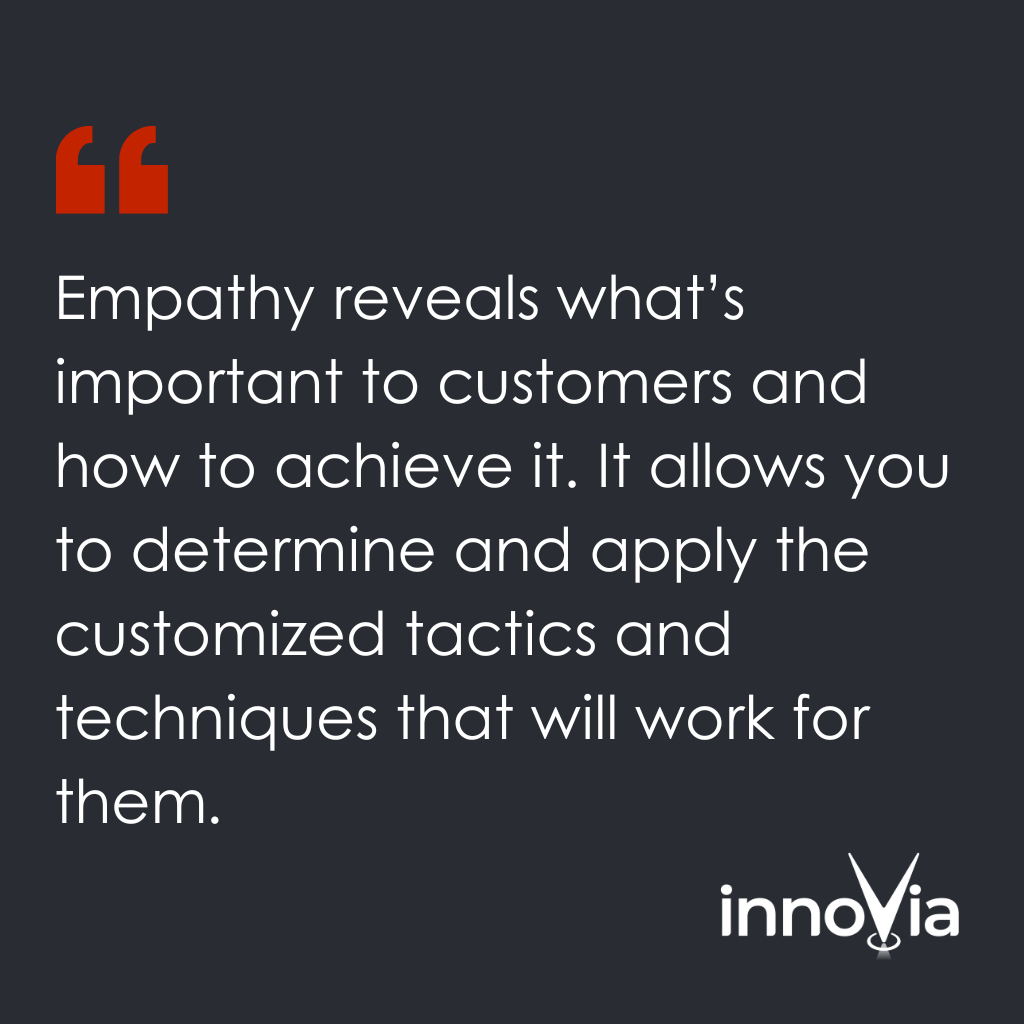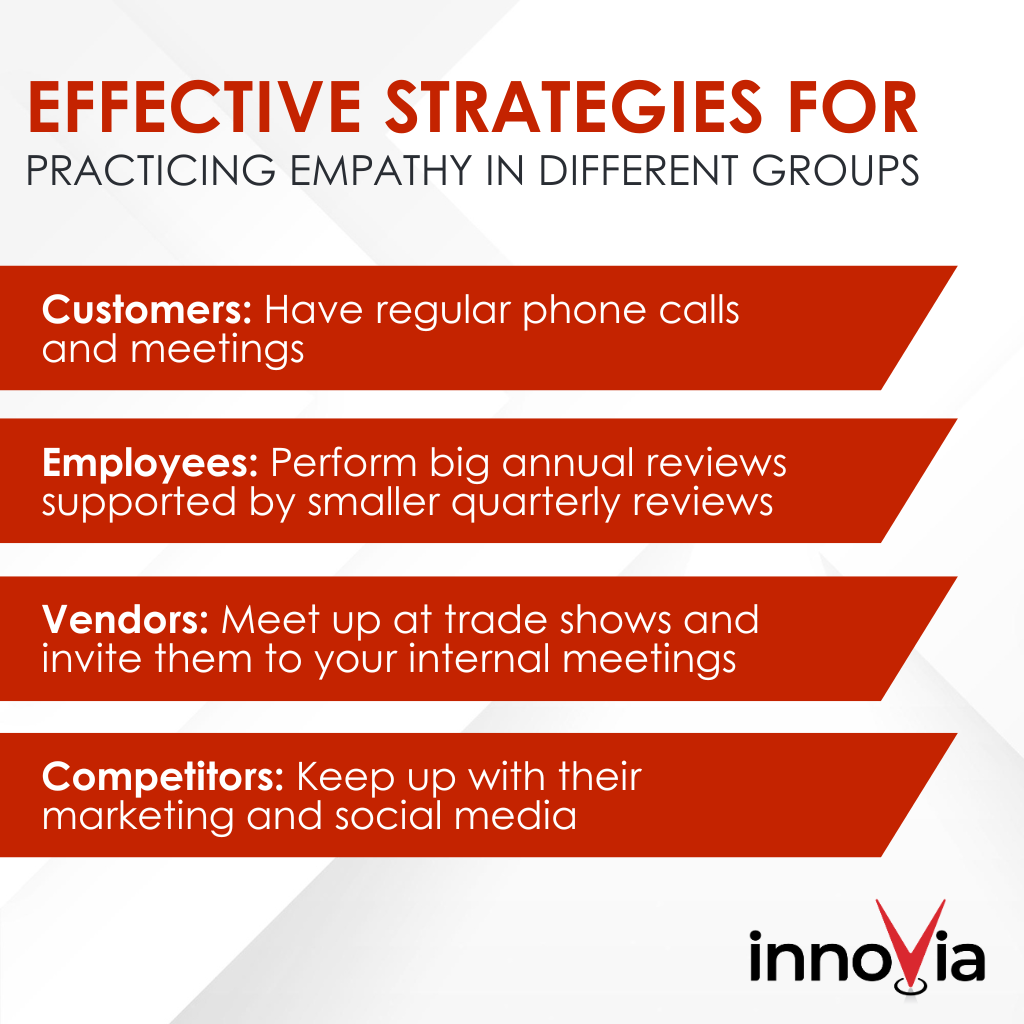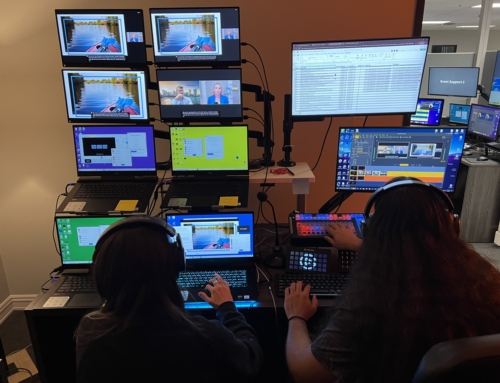In the business world, empathy is simple: put yourself in your clients’ shoes as often and as long as possible.
Why is empathy in customer service so important? At innoVia Productions, we believe that empathy goes far beyond building strong relationships. By keeping it at the core of our customer service strategy, we can better achieve our business goals and help our clients reach their goals, too.
True customer centricity as an event planner begins with intentional empathy. Here’s how we harness empathy to improve relationships and strengthen our business.
How Empathy in Customer Service Leads to Loyalty
The most desirable end result of any service is customer satisfaction and loyalty. Keeping your customers coming back — and inspiring them to spread the word about your organization — ultimately comes down to making them happy.
At innoVia, we realize that having a methodology to help us identify our customers’ wants and needs is key. Empathy reveals what’s important to customers and how to achieve it. It allows you to determine and apply the customized tactics and techniques that will work for them.
It also enables you to be proactive and anticipate your customers’ needs. The overall result is a high level of customer satisfaction and loyalty.
You can’t serve your customers without empathy. Blind, one-size-fits-all customer service might be effective occasionally, but it’s inefficient and rarely fully satisfies the customer. In fact, once a customer receives empathetic customer service, traditional service will pale in comparison!

More Than a Buzzword: Empathy and Customer Centricity at innoVia
Customer centricity is a goal within innoVia. For us, that means putting clients at the center of our decisions.
Our competitors often have other priorities before the customer comes in. For publicly held companies, that could be shareholders. It might be contract owners, business channels, or even equipment for other companies.
We want to start with the customer and work our way out. But before we can do that, we have to walk in their shoes. That’s where empathy comes in. It becomes part of our decision-making process to ask, “How will this affect the customer?”
Skipping that important question leads to guessing at what customers might think, say, or need. Think of it like connecting dots: the more you learn about your client, the more dots you have. And the more empathy you have, the better you can connect those dots. Then, you’ll create a more accurate and focused end result.
Customer centricity is part of our mission, but it’s still a balancing act. We’re not always able to fully address our customers’ wants (otherwise, we’d offer our services for free). In those situations, we rely on transparency and communication. We talk about what we can do and make sure we understand that.
In the end, customer centricity and empathy in customer service are all about making your clients’ needs part of the equation for every decision.
Practicing Empathy With Everyone
When it comes to empathy, we must apply it to our customers, employees, vendors, and competitors. Strong, sustainable relationships are key to success in the events industry; however, it looks a little different for each group.
Customer-Focused Empathy
Failing to practice empathy in customer service diminishes your value and could lead to low retention. Relationships are like an ongoing series of transactions with customers. As desires, needs, and goals change over time, you can practice empathy by keeping up with those changes and consistently aligning your organization with and around your customers.
For example, if a customer has a change in their organizational structure, like getting a new CEO, it’s important to understand how that changes their direction and how providing good service might change.
Employee-Focused Empathy
Employee-focused empathy centers around understanding your employees’ career ambitions and their individual work preferences. Using empathy to understand how people like to work — such as their ideal work-life balance or how well they work with others — can avoid high turnover and encourage job satisfaction.
Vendor-Focused Empathy
Empathizing with your vendors, such as AV technology partners, creates efficiency and improves processes. You must understand what your business means to them and how it affects them. You can even change how you do business to maintain good relationships and help your vendors support you better.
Competitor-Focused Empathy
People tend to forget their competitors when discussing empathy, but it’s just as important to understand your competition as it is your customers. After all, they’re your clients’ alternative!
As the great general Sun Tzu said in The Art of War: “Know the enemy and know yourself; in a hundred battles you will never be in peril.” Understand how they do business — from marketing to talking to customers to acquiring new technology. If you don’t, you could miss new opportunities.

Effective Strategies for Practicing Empathy in Customer Service and Beyond
So, how can you put empathy into action as an event planner? It all comes down to asking the right questions and knowing who you’re asking.
Communicate Often
Practicing empathy starts with communication. You can facilitate this with each group by:
- Customers: Have regular phone calls and meetings
- Employees: Perform big annual reviews supported by smaller quarterly reviews
- Vendors: Meet up at trade shows and invite them to your internal meetings
- Competitors: Keep up with their marketing and social media
Listening closely is the key to getting the most out of these conversations. If you can get someone to talk about themself, their company, or their department, you can gain a lot of useful information that helps you understand what’s important to them. Once you get them storytelling, take notes or record the conversation.
Ask the Right Questions
Let’s dig a little deeper into the questions you should ask customers, employees, vendors, and competitors.
Customers
When meeting with a customer, we recommend doing three-level interviews by talking to individual contributors, department heads, and executives. You can ask each group the same questions but get extremely different answers. Each level has a different business focus.
You might ask each person 50 in-depth questions about their role, their business, and what they want out of an event, but we recommend starting with these three:
- How is your personal success measured?
- What are you happy with?
- If you had a magic wand, what would you change?
The answers to these questions will reveal their goals, expectations, and ambitions.
Employees
Frequent reviews are a great opportunity to find out more about your employees.
Ask questions like:
- What’s important to you, and how can we achieve those things?
- What’s going well?
- What could be improved?
- How can we better apply your strengths?
You can also use software like TINYpulse outside of annual and quarterly reviews. Through the anonymity of these employee engagement platforms, you can obtain honest feedback that you might not get face-to-face.
We used these tools weekly when our employees started working from home to gauge whether they were happy, overworked, or bored. As a result, we learned about remote work’s impact on our culture and process. That little bit of empathy went a long way!
Vendors
The same philosophy applies to vendors. You can ask questions about goals, efficiencies, and processes during meetings and reviews to determine how to strengthen the business relationship from both sides.
Be strategic about this — create a structure to learn more about:
- Their business model
- Their profitability
- How they measure success
- Their company culture
Competitors
It can be awkward to network with and talk to competitors. Still, it’s important to understand what they’re doing, what’s going well, and what they’re struggling with. We typically do this through customer interviews or by asking industry peers — we don’t dig for any trade secrets. We love to hear about what our competitors do well and how they’re lacking.
If you run into a competitor at a trade show or event, ask them questions directly, such as:
- What are they doing that’s fresh and new?
- What is their pricing like?
- What is their process with customers?
Be Ready for Anything
Failing to practice empathy increases the number and size of your blind spots. You’ll likely get knocked off course if you can’t see what’s coming. A lack of empathy can also lead to stagnated process improvement and innovation, which can cripple an organization.
But by keeping empathy in customer service at the forefront of your event planning, you can be ready for any changes.
Empathy is at the core of what we do at innoVia, and we’re always willing to listen, learn, and look ahead. Find out more about us today!






